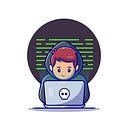Getting Started with Ethical Hacking for Programmers
A Beginner’s Guide to Ethical Hacking and Cybersecurity Skills
Introduction
In today’s digital landscape, cybersecurity is more critical than ever. With rising cyber threats, ethical hacking has emerged as a sought-after skill for programmers who wish to enhance security and protect digital assets. Ethical hacking involves testing systems, networks, and applications for vulnerabilities — legally and with permission — to improve cybersecurity measures. If you’re a programmer looking to expand your expertise, this guide will help you get started with ethical hacking.
What Is Ethical Hacking?
Ethical hacking is the practice of intentionally probing a system for weaknesses to identify and fix security flaws before malicious hackers exploit them. Ethical hackers, also known as white-hat hackers, use the same tools and techniques as cybercriminals but operate within legal and ethical boundaries.
Key Responsibilities of an Ethical Hacker:
- Identifying security loopholes in software, networks, and systems
- Conducting penetration testing and vulnerability assessments
- Reporting findings and recommending security improvements
- Staying updated on the latest cybersecurity threats and defenses
Why Should Programmers Learn Ethical Hacking?
Programmers are the architects of software and applications, making them uniquely positioned to understand and address security vulnerabilities. Here are some reasons why ethical hacking is a valuable skill for programmers:
- Enhancing Security Awareness: Understanding hacking techniques helps in writing more secure code.
- Expanding Career Opportunities: Cybersecurity roles are in high demand, with attractive salaries.
- Developing a Hacker Mindset: Thinking like an attacker allows programmers to build more robust defenses.
- Protecting Personal and Business Data: Knowledge of security best practices can safeguard sensitive information.
Essential Skills for Ethical Hacking
To begin your journey into ethical hacking, you need to master a combination of programming, networking, and security skills. Here are some essential areas to focus on:
1. Programming Languages
A strong programming background is crucial for ethical hacking. Key languages include:
- Python: Used for scripting, automation, and exploit development.
- C and C++: Essential for understanding system vulnerabilities and memory exploits.
- JavaScript: Helps identify web application vulnerabilities like cross-site scripting (XSS).
- SQL: Useful for database security and preventing SQL injection attacks.
2. Networking Fundamentals
Understanding how networks function is essential for penetration testing. Key networking topics include:
- TCP/IP protocols
- Firewalls and intrusion detection systems (IDS)
- DNS, HTTP, and FTP protocols
- Packet sniffing and analysis
3. Operating Systems Knowledge
Ethical hackers work extensively with different operating systems, especially:
- Linux (Kali Linux, Parrot OS): Preferred platforms for penetration testing tools.
- Windows Security: Understanding Windows vulnerabilities and exploits.
4. Web Security
Web applications are prime targets for hackers. Learn about:
- Cross-site scripting (XSS)
- SQL injection
- Security misconfigurations
- Authentication and session management flaws
5. Cryptography and Encryption
Data encryption is a core aspect of cybersecurity. Ethical hackers should understand:
- Hashing algorithms (SHA, MD5, bcrypt)
- Public-key infrastructure (PKI)
- Secure communication protocols (SSL/TLS)
Getting Started with Ethical Hacking
Now that you understand the essential skills, here’s a roadmap to help you begin your ethical hacking journey:
1. Learn the Basics
Start with online courses, books, and tutorials. Some recommended resources include:
- “The Web Application Hacker’s Handbook” by Dafydd Stuttard and Marcus Pinto
- “Hacking: The Art of Exploitation” by Jon Erickson
- Online platforms like Cybrary, Udemy, and Coursera
2. Set Up a Lab Environment
Before practicing hacking techniques, create a safe environment:
- Install Kali Linux or Parrot OS (hacker-friendly Linux distributions)
- Use virtualization tools like VirtualBox or VMware
- Set up testing platforms like Metasploitable or DVWA (Damn Vulnerable Web App)
3. Get Hands-On with Penetration Testing Tools
Familiarize yourself with ethical hacking tools such as:
- Nmap: Network scanning tool
- Metasploit: Penetration testing framework
- Wireshark: Packet analysis tool
- Burp Suite: Web security testing tool
4. Join Ethical Hacking Communities
Connect with cybersecurity experts and enthusiasts through:
- Bug bounty programs (HackerOne, Bugcrowd)
- Online forums (Reddit’s r/netsec, Stack Exchange Security)
- Cybersecurity conferences (DEF CON, Black Hat, OWASP)
5. Earn Ethical Hacking Certifications
Certifications validate your skills and improve job prospects. Consider:
- Certified Ethical Hacker (CEH)
- Offensive Security Certified Professional (OSCP)
- CompTIA Security+
Ethical and Legal Considerations
Ethical hacking requires adherence to strict ethical and legal guidelines. Always:
- Obtain explicit permission before testing any system.
- Follow the Computer Fraud and Abuse Act (CFAA) and relevant cybersecurity laws
- Respect privacy and data protection regulations.
Conclusion
Ethical hacking is a rewarding skill for programmers, offering opportunities to enhance security, protect digital assets, and build a successful career in cybersecurity. By learning key hacking techniques, networking principles, and security tools, programmers can become proficient ethical hackers and contribute to a safer digital world. Start learning today, practice in a controlled environment, and always stay ethical in your approach!
